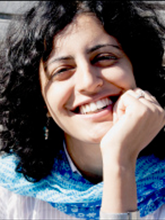Neha Kumar is an Assistant Professor at Georgia Tech, with a joint appointment in the Sam Nunn School of International Affairs and the School of Interactive Computing. She is a computer scientist, designer, and ethnographer, and thrive in spaces where she can wear all three hats at once. Kumar studies new media and information sharing practices of marginalized communities in India, and uses her findings to inform appropriate technology design and interventions.
Before Fall, Kumar was at USC's Annenberg School for Communication and Journalism, where she was honored to be their Digital Diversity Postdoctoral Researcher. Before Annenberg, she was a Research Associate at UW, Seattle. There, Kumar was mentored by Prof. Richard Anderson and Prof. Gaetano Borriello in the Computer Science (CS) department and Prof. Beth Kolko in the Human-Centered Design & Engineering (HCDE) department. Best year ever. One of the projects based out of UW that she continues to work on is Projecting Health, situated in Raebareli district, UP (India), where visual media is being designed and produced locally to address the high infant and maternal mortality rates there (also among the highest in India).
Neha Kumar has co-founded a non-profit mHealth start-up, which targets concerns regarding children's health – early detection of growth, development, and immunization issues – in an under-resourced Indian context. The idea won first prize at a health hackathon organized by CAMTech and held at GE Research in Bangalore, in July 2014. It also won an Innovation Award from CAMTech, which helped her and her team get closer to the launch of their app later this year.
Kumar got her Ph.D. in December 2013 from UC Berkeley's School of Information under the incredible guidance of Prof. Tapan Parikh. Her dissertation research examined new media practices of youth from socioeconomically disadvantaged backgrounds in India, with a view to highlight the innovation and agency of these lead technology adopters as they appropriate the mobile phone. As she studies the production of culture by these youth, she also examined local music practices, the rampant media piracy culture, and the inevitable pull towards social networking. Kumar's dissertation is titled “Mobiles, Media, and the Agency of Indian Youth”. She conducted my field work in rural, semi-urban, and urban parts of North India. She is a native Hindi speaker and used that to her advantage.



